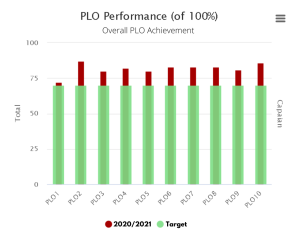The curriculum of BURP were designed to correspond between the intended graduate profile and its outcome (PEOs and PLOs), the current issues, trends, and the user’s need. The approach for designing the 2021 Curriculum follows the Outcomes-Based Curriculum (OBC) strategy currently employed by the university system-wide at Universitas Gadjah Mada. Consequently, the current curriculum of the BURP degree program now employs Program Educational Objectives (PEO), Program Learning Outcomes (PLOs), and Course Learning Outcomes (CLO).
Programme Educational Objectives
The curriculum aims to produce graduates of the Bachelor of Urban and Regional Planning program as reliable, professional, and integrity-driven spatial planners, with research and innovation capabilities, as well as sensitivity to various current and future issues
Bachelor Program in Urban and Regional Planning also has 10 intended Program Learning Outcomes (PLO), which are:
- PLO 1: Adhere to moral values as mandated by Pancasila (national identity and philosophy) and religious beliefs
- PLO 2: Able to work individually and in a multidisciplinary team adhering to academic integrity
- PLO 3: Able to have logical, critical, creative, and systematic thinking and contextualize it
- PLO 4: Able to develop insights and perform well in a professional environment
- PLO 5: Able to elaborate and communicate ideas in a professional network at local, national, and global levels
- PLO 6: Have a proficient understanding and able to apply urban and regional planning theories and concepts, including able to contextualize them into empirical practices
- PLO 7: Mastering the norms, standards, procedures, criteria, techniques, and methods for urban and regional planning
- PLO 8: Able to formulate planning issues and the appropriate concepts to address them, both spatial and non-spatial, in an urban and regional planning context
- PLO 9: Able to apply innovative formal and informal planning procedures in formulating alternatives and decision making processes
- PLO 10: Able to recommend solution through spatial planning interventions in a communicative, comprehensive, and sustainable manners
The curriculum of the undergraduate program of Urban and Regional Planning is a curriculum with 144 credits/SKS. This credits divided into 8 semesters with a period of 4 years. Each student has around 56 courses consist of 49 compulsory courses (130 credits), and 7 elective courses (14 credits) which can be selected from 34 elective courses offered.
List of courses, course description, and the CLO & PLO can be seen here.
Student will be directed to develop scientific specialties in accordance with their interests with supervision from an academic supervisor (DPA). In 1st to 5th semester, student will get the general competence than will guided by DPA to develop a deeper interest and choosing 7 elective courses in 6th and 7th semester.
There are 34 elective courses which can be combined to form a specific interests. Student only required to take 7 elective courses out of 34 available elective courses. There are 5 specific interests can be form, namely :
- Urban Planning and Management
- Neighborhood and Regional Planning
- Infrastructure Planning and Development
- Housing and Real Estate Planning
- Disaster Mitigation Based Planning
Futher information about curriculum of undergraduate program of urban and regional planning can be seen at the student handbook
Student Handbook (2025/2026)
Buku Panduan Akademik Sarjana Perencanaan Wilayah dan Kota Tahun 2025/2026 | Student Handbook 2025/2026
Last update August 29 2022
-AH-


